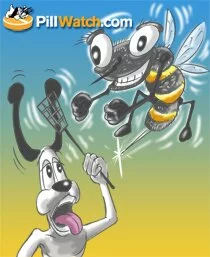
The world around us is so diverse, magnificent, and fascinating! The life was given to a human being to enjoy it. Our kind was also endowed with mind to admire the nature, to absorb its beauty, to feel its mightiness. People with creative genius cannot help being enchanted with everything that surrounds them: the tiniest creature is a real miracle to a creative personality.
Indeed, our planet is crammed with various and so incredible inhabitants that discovering and observing them can be a matter of the whole life. However, the reality is cruel to some of us: many people develop phobias of certain creatures surrounding them; others cannot fully enjoy their lives being allergic to the particular natural things, for example, insect bites and stings, which are, actually, so common if one tries to coalesce with nature.
Allergy to insect venom is quite a widely-spread condition; however, it is comparatively rarely life-threatening. Nevertheless, one should know the basics of this disorder to timely and correctly help those unlucky who suffer from it.
To start with, honeybees, bumble bees, hornets, wasps, yellow jackets, and fire ants are the most common insects capable of injecting their stings to release the venom into the body tissues of a human being.
In general, allergy to insect bites and stings occurs and develops similarly to all the other types of allergic reactions. Namely, the immune system of a sensitive to insect venom people creates antibodies (called Immunoglobulin type E) to this substance, which provoke the release of histamine and other allergic reaction mediators if exposed to the venom. Proteins in this insect defensive substance are the main components, which trigger allergy in sensitive people.
As a result, such consequences as hives, skin rash, pain, nausea, vomiting, itching inside the mouth, swelling, redness and itching at the site or at the larger areas near the sight of a sting may follow the bite of an insect. These symptoms can last for hours or even for several days after a person is stung.
These not dangerous reactions may be treated at home by applying cold compresses, baking soda, vinegar (to neutralize the acidic venom of many insects), meat tenderizer, salt, toothpaste, and even copper coins to the spot of the injury. Though, no scientific evidence of these measures effectiveness is available, except for the pain relief with cold compresses.
It is worthy to note that in case of a honey bee bite the sting should be removed as soon as possible in order to prevent the release of the larger amount of the venom – this will help reduce the symptoms. Local anesthetics and topical steroids, or oral antihistamines and steroids can be used to medicinally fight the sting of an insect.
The bad news about insects bites in allergic people is that the reaction is often more severe with every subsequent sting. The most dangerous allergic condition is called anaphylactic shock, which includes overall body reaction with the disruption of breathing due to the swelling of the airways, as well as swelling of the major body parts as face, neck, arms and legs. Dizziness, fainting, chest pain, wheezing, nausea, vomiting, and diarrhea are among the symptoms of anaphylaxis.
This condition is characterized by the extremely low blood pressure, which causes these symptoms.
The most common medication in case of anaphylactic shock is epinephrine given by injection. Antihistamines are used to reduce histamine activity; corticosteroids also alleviate the immune response and swelling. Saline solution is used to increase blood pressure. In addition, oxygen may be supplied through the tube or mask if a patient has difficulty breathing.

One more way to fight allergy to insect bites is desensitization or immunotherapy. It is used in people extremely allergic to the stings. Shots of increasing amount of insect venom are made for the body to “get used” to it and stop overreacting in case of insects attack.
Along with medicinal treatment options one can use several easy self-care tips to avoid insect bites allergy: never walk barefooted on the grass, avoid places where insects accumulate, have their nests destroyed around your house. However, the most unusual, but surprisingly effective tip is: try no to look and smell like a flower, thus insects will not be interested in you!
| Tip for you : Sign-in with Your OpenID and post faster, easier and with easy access to all your past posts. | |
|
Your Nick: |















